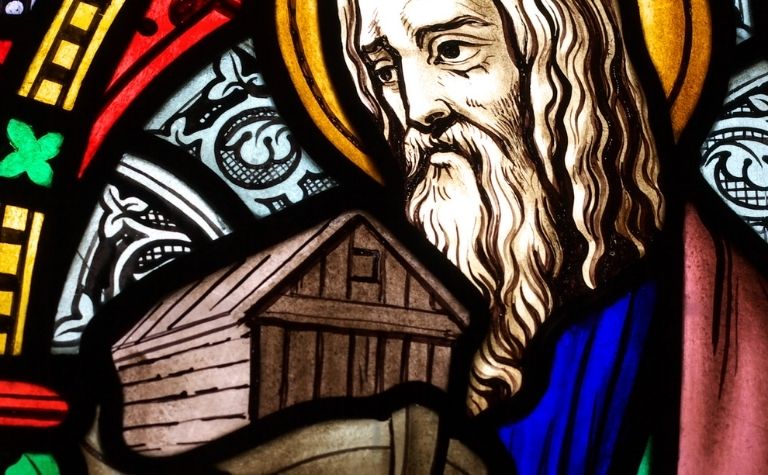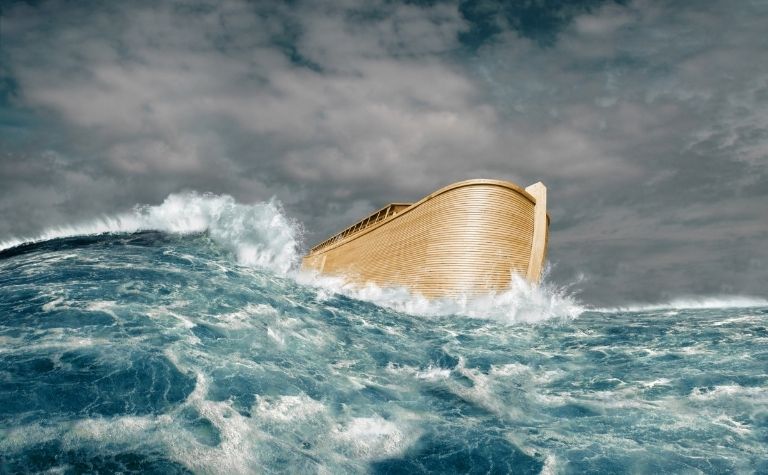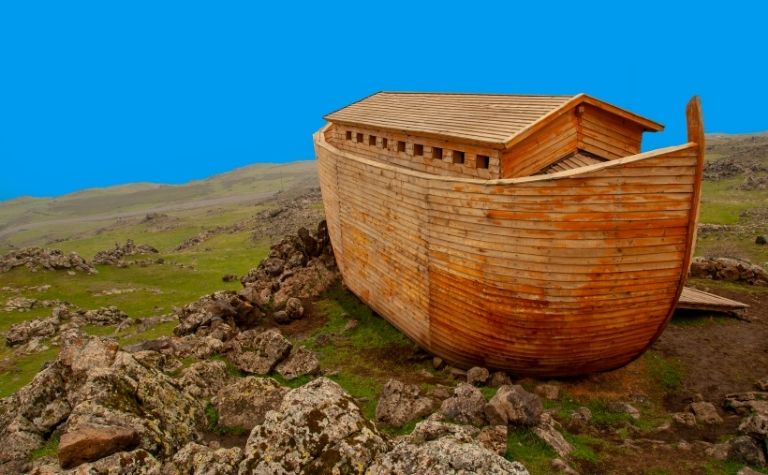The New Testament praises Noah as a man of extraordinary faith (Heb. 11:7), which is apparent in the story of the flood (Gen. 6-9). In addition to the flood account, the Bible reveals many fascinating details about Noah, such as that his grandfather was Methuselah (Gen. 5:25-32) and that he was a preacher of righteousness (2 Pet. 2:5). Another detail people often wonder about is how long he lived.
Noah died at the age of 950, according to the book of Genesis. Among those mentioned in the genealogy in Genesis chapter five, only Methuselah (969 years) and Jered (962 years) lived longer lives than Noah. Noah’s age is one of the most well-attested of any patriarch, as Genesis mentions it several times.
Why is the flood dated in relation to Noah’s age? How long did Noah live after the flood? Who also lived for more than 900 years, according to Genesis? Keep reading to learn the answers to these questions and others.
Also see How Old Was Noah When He Built the Ark? to learn more.

Why is the flood dated in relation to Noah’s age?
Elsewhere in the Bible, the authors of historical narratives and prophecies commonly mention the name of a king or other ruler to date an important event (e.g. Isa. 6:1 Ezek. 1:1-2). Such references tie the work of God to a fixed point in history and provide important context to stories.
Noah is a critical figure not only in primeval history but in the book of Genesis, in the history of Israel, and in the rest of the Bible, so it’s no surprise that one of the most significant events in human history is dated according to, not his rule like the examples mentioned above, but his age.
Genesis mentions Noah’s age multiple times
Genesis states that “Noah was six hundred years old when the flood of waters came upon the earth” (Gen. 7:6). This is the second time Genesis mentions Noah’s age.
The first time readers encounter a reference to it is in the genealogy at the conclusion of Genesis chapter five. Noah’s age is given in the context of when he started to have children. “After Noah was 500 years old, Noah fathered Shem, Ham, and Japheth” (Gen. 5:24).
The following three times Genesis mentions Noah’s age is in relation to the flood narrative. The fixed point in time that is referenced throughout the story is Noah, the builder of the ark.
- 600th year; 2nd month; 17th day: Genesis 7:11 reads, “In the six hundredth year of Noah’s life, in the second month, on the seventeenth day of the month, on that day all the fountains of the great deep burst forth, and the windows of the heavens were opened.”
- 601st year; 1st month; 1st day: Genesis 8:13 reads, “In the six hundred and first year, in the first month, the first day of the month, the waters were dried from off the earth. And Noah removed the covering of the ark and looked, and behold, the face of the ground was dry.”
- 601st year; 2nd month; 27th day: Genesis 8:14 reads, “In the second month, on the twenty-seventh day of the month, the earth had dried out.”
Also see How Long Was Noah In the Ark? to learn more.

How long did Noah live after the flood?
The story of Noah continues in Genesis after the flood waters subside. First, God establishes a covenant with Noah (Gen. 8:20-9:17). Second, readers learn more about him and his sons, including a disastrous scene that reveals that the family wasn’t saved because they were sinless (Gen. 9:18-29).
The passage ends with a report of Noah’s death. “After the flood Noah lived 350 years. All the days of Noah were 950 years, and he died” (Gen. 9:28-29).
As revealed in the story of Adam and Eve, and confirmed elsewhere in the Bible, the consequence of sin is death (Rom. 6:23). Adam and Eve died physically, and so did their other descendants, with the exception of Enoch (Gen. 5:24). Even though Noah was righteous, blameless, and walked with God (Gen. 6:), he was still a sinner (Rom. 3:23).
| Patriarch | Genesis | Age |
|---|---|---|
| Adam | 5:5 | Thus all the days that Adam lived were 930 years, and he died. |
| Seth | 5:8 | Thus all the days of Seth were 912 years, and he died. |
| Enosh | 5:11 | Thus all the days of Enosh were 905 years, and he died. |
| Kenan | 5:14 | Thus all the days of Kenan were 910 years, and he died. |
| Mahalalel | 5:17 | Thus all the days of Mahalalel were 895 years, and he died. |
| Patriarch | Genesis | Age |
|---|---|---|
| Jared | 5:20 | Thus all the days of Jared were 962 years, and he died. |
| Enoch | 5:23-24 | Thus all the days of Enoch were 365 years. Enoch walked with God, and he was not, for God took him. |
| Methuselah | 5:27 | Thus all the days of Methuselah were 969 years, and he died. |
| Lamech | 5:31 | Thus all the days of Lamech were 777 years, and he died. |
| Noah | 9:29 | All the days of Noah were 950 years, and he died. |
The description of Noah in Genesis chapter five is an exception to the pattern found in the genealogy (along with Enoch). Instead of concluding with Noah’s age at death and the phrase “and he died,” Genesis tells the story of the flood and concludes Noah’s biography at the conclusion of chapter nine.
Also see Why Did God Flood the Earth? to learn more.

Dates mentioned in the flood story in Genesis
The flood story is one of the most precisely dated events in the book of Genesis.
| Reference | Verse |
|---|---|
| 7:12 | And rain fell upon the earth forty days and forty nights. |
| 7:24 | And the waters prevailed on the earth 150 days. |
| 8:3 | and the waters receded from the earth continually. At the end of 150 days the waters had abated, |
| 8:4 | and in the seventh month, on the seventeenth day of the month, the ark came to rest on the mountains of Ararat. |
| 8:5 | And the waters continued to abate until the tenth month; in the tenth month, on the first day of the month, the tops of the mountains were seen. |
| 8:6 | At the end of forty days Noah opened the window of the ark that he had made |
| 8:10 | He waited another seven days, and again he sent forth the dove out of the ark. |
| 8:12 | Then he waited another seven days and sent forth the dove, and she did not return to him anymore. |
8 New Testament Reference to Noah
- Matthew 24:37, “For as were the days of Noah, so will be the coming of the Son of Man.”
- Matthew 24:38, “For as in those days before the flood they were eating and drinking, marrying and giving in marriage, until the day when Noah entered the ark”
- Luke 3:36, “the son of Cainan, the son of Arphaxad, the son of Shem, the son of Noah, the son of Lamech”
- Luke 17:26, “Just as it was in the days of Noah, so will it be in the days of the Son of Man.”
- Luke 17:27, “They were eating and drinking and marrying and being given in marriage, until the day when Noah entered the ark, and the flood came and destroyed them all.”
- Hebrews 11:7, “By faith Noah, being warned by God concerning events as yet unseen, in reverent fear constructed an ark for the saving of his household. By this he condemned the world and became an heir of the righteousness that comes by faith.”
- 1 Peter 3:20, “because they formerly did not obey, when God’s patience waited in the days of Noah, while the ark was being prepared, in which a few, that is, eight persons, were brought safely through water”
- 2 Peter 2:5, “if he did not spare the ancient world, but preserved Noah, a herald of righteousness, with seven others, when he brought a flood upon the world of the ungodly”
Also see Where Is Noah’s Ark? to learn more.
References:
[1] Source
[2] Source
Related Questions
Noah stands out to Bible readers because of the flood story. Yet, he first stood out to God because of his righteousness (Gen. 6:9). The New Testament mentions Noah, along with Abraham, Moses, and...
The story of Noah, the flood, and the ark is one of the most iconic narratives in the Bible. Not only does the magnitude of the floodwaters leave readers awe-struck, but so does the faith that Noah...
